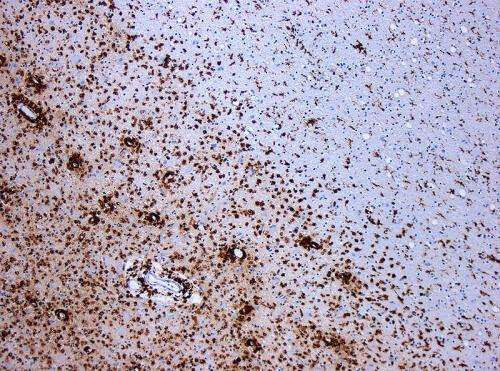by Claes Björnberg, Umea University Credit: Pixabay/CC0 Public Domain Many risk factors for multiple sclerosis (MS), which causes damage to the central nervous system, have been identified. However, it is still unknown why the disease occurs. In recent years, the herpesvirus Epstein-Barr virus (EBV) has been established as the leading risk factor. “Over 90% of the...
Tag: <span>Epstein-Barr virus</span>
Epstein-Barr virus associated tumors and drug repurposing
MARY ANN LIEBERT, INC./GENETIC ENGINEERING NEWS IMAGE: THE LATEST ADVANCES AT THE INTERSECTION OF POSTGENOMICS MEDICINE, BIOTECHNOLOGY AND GLOBAL SOCIETY, INCLUDING THE INTEGRATION OF MULTI-OMICS KNOWLEDGE, DATA ANALYSES AND MODELING, AND APPLICATIONS OF HIGH-THROUGHPUT APPROACHES TO STUDY COMPLEX BIOLOGICAL AND SOCIETAL PROBLEMS. PUBLIC POLICY, GOVERNANCE AND SOCIETAL ASPECTS OF THE LARGE-SCALE BIOLOGY AND 21ST CENTURY...
More Evidence for Epstein-Barr Virus’ Role in MS
Jim Kling November 08, 2022 Epstein-Barr Virus (EBV) is a suspect in the development of multiple sclerosis (MS), and recent research developments have strengthened that connection. In 2022, two studies received quite a bit of attention. One showed that EBV seroconversion occurs in the years prior to MS diagnosis in virtually every patient, and that serum levels of the neuronal damage...
Two new Epstein-Barr virus vaccines induce neutralizing antibodies in mice
by Bob Yirka, Medical Xpress Close-up images and structural models of the gH/GL and gH/gL/gp42 nanoparticles from the two vaccines. Credit: Science Translational Medicine (2022). DOI: 10.1126/scitranslmed.abf3685 A team of researchers from the French health care company Sanofi, working with the National Institutes of Health and the National Cancer Institute in the U.S., has developed two new...
Study identifies how Epstein-Barr virus triggers multiple sclerosis
A new study found that part of the Epstein-Barr virus mimics a protein made in the brain and spinal cord, leading the immune system to mistakenly attack the body’s nerve cells. Scientists have long suspected — but failed to prove — a link between certain viral infections and the development of multiple sclerosis, a crippling...
Epstein-barr virus: It causes mono and maybe MS. Is a vaccine near?
The mononucleosis virus, Epstein-Barr, has become a major suspect in the search for what causes multiple sclerosis. Now researchers are raising the next logical question—can we stop both MS and mononucleosis by preventing Epstein-Barr infections, which occur in 95% of adults? Epstein-Barr vaccines currently under development by the U.S. National Institutes of Health (NIH) and the pharmaceutical...
Epstein-Barr virus may be leading cause of multiple sclerosis
by Harvard T.H. Chan School of Public Health Demyelination by MS. The CD68 colored tissue shows several macrophages in the area of the lesion. Original scale 1:100. Credit: Marvin 101/Wikipedia Multiple sclerosis (MS), a progressive disease that affects 2.8 million people worldwide and for which there is no definitive cure, is likely caused by infection...
mRNA vaccine makers set sights on shingles and the Epstein-Barr virus
By Rich Haridy January 05, 2022 As Moderna works on a mRNA vaccine against the Epstein-Barr virus, Pfizer sets its mRNA sights on a shingles vaccineMattLphotography/Depositphotos More advances on the mRNA vaccine front this week as both Pfizer and Moderna move forward on new viral targets for future vaccines. Pfizer is turning its focus to...
A novel therapeutic approach against Epstein-Barr-virus-associated tumors
by The University of Hong Kong This electron microscopic image of two Epstein Barr Virus virions (viral particles) shows round capsids—protein-encased genetic material—loosely surrounded by the membrane envelope. A research team at LKS Faculty of Medicine, The University of Hong Kong (HKUMed) reports that exosomes derived from Vδ2-T cells (Vδ2-T-Exos) can effectively control Epstein-Barr-virus-associated tumors and induce T-cell...
New immunotherapy improves MS symptoms
A world-first clinical trial of a new cellular immunotherapy for multiple sclerosis (MS) has improved symptoms and quality of life for the majority of patients. The treatment targets the Epstein-Barr virus (EBV), and is based on a theory formulated by University of Queensland and Royal Brisbane and Women’s Hospital (RBWH) researcher Professor Michael Pender. This...







